A Different World

Walk the Talk
Green Perspective
Sustainability


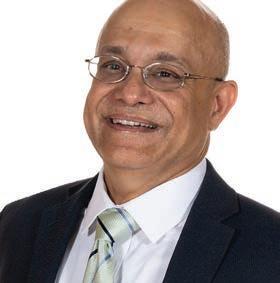

A Different World

Walk the Talk
Green Perspective
Sustainability



Healthcare in the United States needs reform. Is business the antidote?
The healthcare industry is facing many challenges: workforce shortages, rising medical expenses, technological advancements, and disparities in access to care, among many others. As one of the most consequential sectors of the nation’s economy, change is necessary—and inevitable. The first step to addressing the healthcare crisis, according to Paul Almeida, dean and William R. Berkley Chair, lies within the power of business.
McDonough recently launched an MBA Certificate in the Business of Healthcare. Why is Georgetown the right school to address healthcare reform?
Washington, D.C., is home to major medical research institutions, top hospitals, pharmaceutical companies, influential government agencies, and policymakers, and of course our own top School of Medicine. Georgetown has the power to convene the right people, embrace interdisciplinary expertise, and apply the business tools, techniques, and processes to address the challenges of healthcare.
Additionally, it is aligned with our Jesuit mission to be actively engaged in research and teaching that leads to better outcomes for business and society. Beyond economic opportunity, we have a moral obligation to ensure the well-being of our communities so everyone has the ability to flourish and live a prosperous life.
What is the role of business in the future of healthcare?
It’s in everyone’s interest to improve world health outcomes. Healthcare is integral to personal well-being and quality of life, and it’s also a worldwide system that fosters economic
stability. In a perfect world, people everywhere would have access to the standard of care they need to thrive, but the reality is that healthcare is different across every corner of the globe and each fragmented system has its own problems to overcome.
The areas in need of reform can be connected back to fundamental business practices—management, leadership, the application of technology, logistics, and innovation. Additionally, with a system as complex as healthcare, solutions will need to cross multiple sectors to be effective. Business is particularly good at evaluating the interactions between functions and identifying new ways to improve and revitalize, and as a result, it will be an important catalyst for change in healthcare.
How does a healthy or unhealthy society impact business?
The global pandemic taught us firsthand how interconnected health and well-being are to the prosperity of our communities. There are vast implications for a society that doesn’t prioritize the health of its people, such as decreased workforce productivity, higher healthcare expenses and insurance premiums, declines in labor force participation, and other socioeconomic factors that impact businesses and their stakeholders. Healthcare is one of the largest industries in the United States, and it employs a considerable percentage of the population. When we invest in the success of healthcare organizations and their people, we create a better economic outlook for businesses, the economy, and the nation at large.
COVER STORY | 14 >
Paper Chase
Washington Post Executive Editor
Sally Buzbee on managing the modern newsroom—and why the goal is to be essential.
FEATURE | 20 Navigating Generational Divides
How to recruit and retain the next generation of workers.
“ I lear ned pretty early on that the goal of business is not to go out and chase venture capital in order to feel important in investors’ eyes. The goal is to follow your path in life and to have a mission you believe in.”




PATHS | 06
Landing the Interview: Real Talk
Beyond Business: Lead the Way
Six Degrees: Baby Steps
INNOVATIONS | 10
Buying / Selling: Visions of Green
Making the Case: Data Wonks
The Edge: Digital Diplomacy Pitch Deck: Fixed Funding
Dean, William R. Berkley Chair Paul Almeida
Associate Dean, Chief Marketing and Communications Officer
Teresa Mannix
Senior Director of Marketing and Communications
Samantha Krause
Associate Director of Publications and Design
Martha Holland
Director of Alumni Relations and Corporate Partnerships
Sara Solin Martinez
Creative Direction 2communiqué
Editorial Direction Dog Ear Creative
Staff Writer
Rachel Ellis
Georgetown Business welcomes inquiries, opinions, and comments from its readers. Please send an email to GeorgetownBusiness@ georgetown.edu.
CONNECTIONS | 32
My Shot: Music Maker
My First Job: Leap of Faith Class Notes
Send alumni address changes to addup@georgetown.edu or contact alumni records at (202) 687-1994.
Follow us on X @msbgu @MSBalumni
Like us on Facebook
Georgetown McDonough School of Business
Follow us on Instagram @georgetownmcdonough
Join us on LinkedIn
Georgetown University
McDonough School of Business Alumni

As the U.S. healthcare system experiences unprecedented challenges marked by rising medical expenses and costs of prescription drugs, federal regulations, and technological disruptions, Georgetown McDonough launched an MBA Certificate in the Business of Healthcare in spring 2024 to prepare graduates to tackle critical issues and inspire forward-thinking solutions to the healthcare system. Drawing from McDonough’s location in Washington, D.C., as well as from Georgetown’s top schools of medicine and health, students will have the opportunity to immerse themselves in the government landscape to examine how business and policy interact within the companies, products, and services that operate local and national healthcare markets. The certificate will be taught in person and is open to Full-time, Flex, and Flex MBA Online students.
Through a collaborative effort with top undergraduate business schools from across the United States, the Business Scholars Institute supports recent graduates as they transition into the workforce, build their networks, and strive to make a positive impact on the world through business. The initiative intends to continue the process of formation that starts during a student’s undergraduate journey and equip them with whole-person programming, mentorship, and leadership development alongside a community of people in a similar phase of life. The institute will launch its first cohort of “City Communities” this summer to connect alumni across the country through events, leadership and career development programming, and volunteer opportunities.
During the annual Leonsis Family Entrepreneurship Prize “Bark Tank” Pitch Competition, Georgetown Entrepreneurship announced a significant $5 million gift from Ted Leonsis (C’77, P’14,’15), founder, chairman, principal partner, and chief executive officer of Monumental Sports & Entertainment, and his family, to provide permanent support for the Bark Tank Pitch Competition so that it exists at Georgetown in perpetuity. The gift also will establish the Leonsis Family Venture Development Program to support student startups, incubator programs, and other entrepreneurial programming across the university.
Since Bark Tank’s inception, $975,000 in prizes have been awarded to 60 different ventures, and those ventures have gone on to raise more than $295 million and create over 1,000 jobs.

AACSB International honored McDonough among 26 schools in its Innovations That Inspire member spotlight program for the MBA Executive Challenge—an immersive, day-long role-play case competition that serves as the final exam for the required Leadership Communications course.
The Executive Challenge was launched in 2017 for all first-year, Full-time MBA students as a way to provide real-world perspectives on how to deliver effective leadership communications. Each year, more than 100 alumni and senior executives return to the Hilltop to simulate a variety of communication challenges that students will face in the boardroom — from meeting disruptions to executive disagreements to handling tough negotiations — while students try to persuade, motivate, and build relationships with alumni in the process.
To support the advancement of women in the workplace, Georgetown McDonough launched the Kosoy Women in Business program to offer professional development opportunities for rising undergraduate student leaders. The initiative is made possible by the generosity of Brian and Andrea Kosoy (P’25), who will support a select number of students throughout the academic year for transformational leadership development, skill-building, and growth.
With 41% of women in the recent incoming undergraduate business class, the Kosoy Women in Business program seeks to harness the potential of a rising class of women students as a way to bridge leadership gaps, increase the representation of female business leaders, and provide exposure to a range of voices in the industry. Students will explore topics such as self-advocacy, negotiation, personal finance, and more to gain tangible and practical skills to address common challenges women face in business.

“ W hen we view portion efforts through a holistic lens, we give consumers the tools they need to make informed decisions about food and wellness while supporting broader corporate goals to reduce waste and lower costs.”
—HANK CARDELLO, CHAIR OF THE PORTION BALANCE COALITION AT BUSINESS FOR IMPACT, DURING THE RELEASE OF THE “POWER OF PORTIONS” RESEARCH REPORT
THE INTERVIEWER
Rahul Kumar (MS-GRA’24)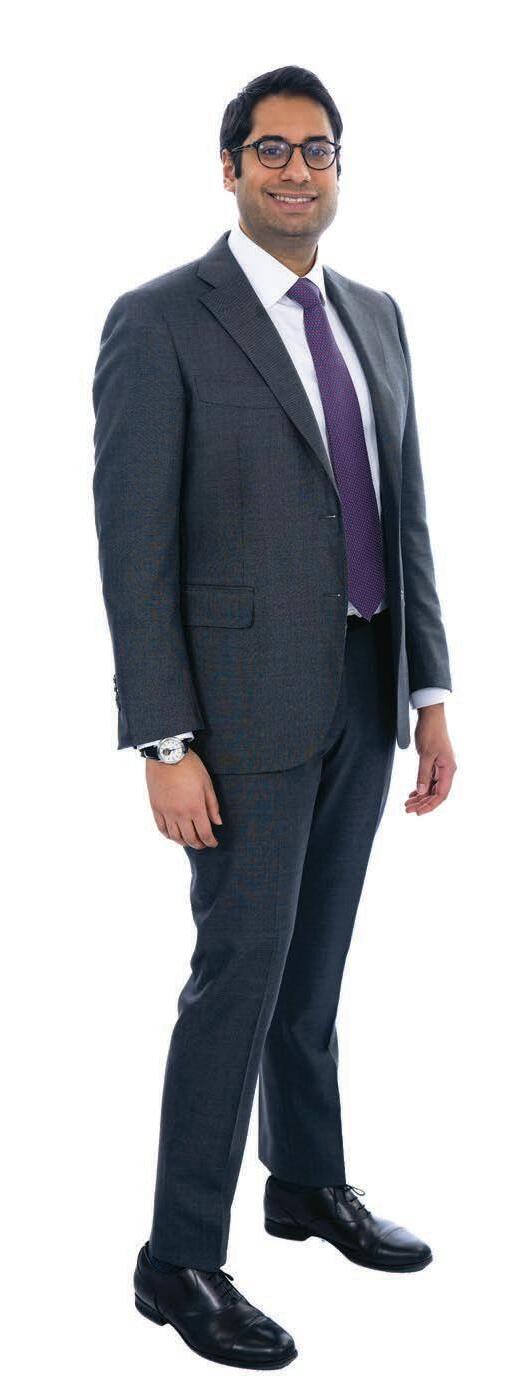
Lessons on how to navigate the $2 trillion real estate marketplace.
rahul kumar (MS-GRA’24) talks with Bob Steers (B’75, P’06, ’08, ’10), executive chairman of Cohen & Steers, chair of the McDonough Board of Advisors, and a member of the Steers Center for Global Real Estate Advisory Board, about his career in real estate — and what he sees for the industry’s future.
How did the university and its community propel you toward a career in real estate?
Candidly, when I arrived at Georgetown, I had no idea what I wanted to do. There were two turning points in my academic development. The first being Bill Droms, professor of finance and investments. That was my first exposure to finance and investing, and it resonated with me.
There were a number of courses focused on corporate social responsibility. It hadn’t occurred to me that businesses did anything beyond making money. Firms like IBM were taking the leadership position in that space. What they were doing then would seem pretty simple today, but it was interesting. That’s what drove me toward the investment side.
How has your career evolved?
In 1986, when we started our company, I had about 10 years of experience as an analyst looking at emerging growth opportunities. My training taught me to think in terms of waves of change. Our concept was that commercial real estate, which was owned 99% privately by insurance companies and pension funds, generates contractual income. We believed real estate would become more securitized every year. When we started our company, the entire market capitalization of U.S.-listed real estate was less than $6 billion. Today, it’s a $2 trillion marketplace.
We contemplated this wave of change. We positioned our firm very modestly at first to generate a track record. It’s almost impossible to have a great concept and time it perfectly. We positioned ourselves so we didn’t have to be right in the first few years. During that time, we focused on building an investment process and organization, so that when investors decided there was merit and interest in what we did, we would be the obvious choice. There are a number of takeaways from that process. When you see a wave of change or an innovation that just strikes a chord and seems right to you, pursue it.
Where do you see the next wave of change coming?
Waves of change are a moving target. With respect to core property types, for example retail properties, they’ve been through their own waves of change. The e-commerce apocalypse for retail started about 10 years ago. At that time, there were those that said no one will ever shop in brick and mortar retail venues. Certainly e-commerce has eaten into retail sales significantly, but it is by no means the predominant venue. Retail went through 10 years of right-sizing to accommodate changing buying patterns. In 2023, retail property types were the top performers in the REIT marketplace. Why? Because they actually shrunk their supply and now they’re in a great position.
Thinking about waves of change on existing property types — the office will be next. It might take six or eight years to eliminate obsolete offices, to build new offices, and to accommodate new cultural practices. But the office is not going to go away. So there’ll be a wave of change that will create opportunities.
There are waves of change that ripple through real estate constantly. And if you’re looking in the rearview mirror, you’re going to get left behind.
Reflecting on your career, can you share a lesson you learned the hard way?
If you’re lucky enough to have the passion for something, you just have to go for it and stick with it, because it gives you purpose and you enjoy it. My advice is to keep going until you find something that resonates with you.

The Qiyadat Georgetown women’s program, which started in 2020, was founded with the concept of mentorship and the idea of “lifting others as you climb” at the forefront.

Nouf Abdullah Al Rakan founded a program to launch the leadership careers of women across the globe.
as the founder and executive director of the Qiyadat Global-Georgetown Women’s Leadership program and an alumna of the M.A. in International Business and Policy, Nouf Abdullah Al Rakan (MA-IBP’18) is using her strong Hoya roots to influence the next generation of female business leaders.
Abdullah Al Rakan is dedicated to promoting growth, empowerment, leadership and management skills, and confidence in the lives of women in business from all over the world.
“I care a lot about helping other women because I see that sometimes even small gestures have large impacts,” Abdullah Al Rakan said.
The Qiyadat Global program, offered through McDonough’s Office of Custom Executive Education, responds to the continued need for diverse organizations to develop the leadership acumen of their female leaders. It’s specifically designed for female middle managers who have shown high potential in business, government, or not-for-profit organizations and who currently exhibit strong leadership skills.
The Qiyadat program, which started in 2020, was founded with the concept of mentorship and the idea of “lifting others as you climb” at the forefront. Growing up, and as she entered her business career, Abdullah Al Rakan said she lacked
female mentors in the business sector, especially in the Middle East and North Africa region. This realization was one of the primary reasons for growing the Qiyadat program — which has participants from 29 countries. Nearly 500 women across the world have participated since the program’s launch.
“In Saudi Arabia, I did not have the network of support that I needed when I started out as a female business owner,” she said. “I also didn’t have any proper leadership training at the time. But sometimes, good things come from your own agony and your own struggle.”
The program has expanded each year and is now a global network of participants, alumni, and prospective cohort members. Abdullah Al Rakan says it’s powerful to hear from women who have benefited from the program.
“We initially created WhatsApp groups for each cohort for logistical purposes,” she said. “But these chats have served as communities. We’ve received hundreds of messages from our participants — if they got a promotion, had a baby, changed their career, or even traveled recently — all of these messages mentioned how important the program was for their successes.”
Abdullah Al Rakan values the diverse backgrounds, experiences, and cultures of the women in the program. She said it’s crucial to have unique perspectives in any learning environment and hopes to expand to other regions of the world in the years to come.
“I’ve worked with people who differ from me,” she said. “And that is the recipe for success. Not to oppose each other, but to find the middle ground and work effectively with one another in achieving a common goal.” —RACHEL ELLIS

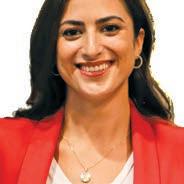
I was encouraged to pursue the Georgetown MBA by former colleagues and Hoyas
Dave Fedigan (MBA’14) & Casey Minnik (MBA’16)
Georgetown Venture Lab
Joined to build and grow our business
Speaking to students in courses such as Understanding Entrepreneurship, taught by
With our company based in Washington, D.C., we frequently return to campus to engage with Georgetown Entrepreneurship and support other Hoyas, including
InSITE Fellowship
Serving as a client for student organizations
Jeff Reid
Professor of the Practice; Founding Director of Georgetown Entrepreneurship
SIX DEGRESS
Alli Cavasino (MBA’22) (left) and Natalie Poston (MBA’21) (right) met in 2019 during their Sustainable Business Models class where they realized their mutual passion for sustainability, entrepreneurship, and purpose-driven innovation. They combined their skills to incubate the idea for JoyLet—a premium baby gear rental company designed to better serve parents and the environment—and pitched the concept during the Lean Startup Principles course. Since their time on the Hilltop, the duo has leveraged their Georgetown network to build and scale their company and mentor future Hoyapreneurs along the way.


We met during our courses in the MBA program and built our business model in the Lean Startup Principles course taught by
J.S. Gamble
Adjunct Professor of Strategy
We have presented JoyLet at numerous awards and pitch competitions, including
Georgetown Entrepreneurship Challenge, DC Startup Week Early Stage Pitch Competition, Leonsis Entrepreneurship Prize “Bark Tank” Pitch Competition, Georgetown Entrepreneurship Alliance Alumni Pitch Competition
We are also proud to hire fellow Hoyas for internships and fulltime roles at JoyLet.
As our full-time operations and customer success associate, we hired
To hire Georgetown Startup Interns We worked with
Mike Malloy (G’12)
Georgetown Entrepreneur in Residence
Vishal Agrawal on making sustainability more sustainable for business.
Vishal agrawal, Henry J. Blommer Family Endowed Chair in Sustainable Business, is one of the leading sustainable business researchers in the world. He is committed to analyzing the role of corporations in addressing sustainability goals, as well as preparing future generations of leaders who can use business concepts to tackle global climate concerns.
Agrawal, who also is the academic director of McDonough’s Business of Sustainability Initiative, researches how businesses can incorporate sustainability in their operations and supply chains. Understanding that most environmental challenges can be solved by tackling the business problems behind them, he helped create the world’s first interdisciplinary M.S. in Environment and Sustainability Management degree. A partnership with Georgetown’s Earth Commons Institute and the Graduate School of Arts & Sciences, the program equips rising leaders with both the science and business skills needed to address sustainability challenges for any organization.
Here Agrawal shares his thoughts on how businesses can embed sustainability in their business model to ensure a lasting impact.
A Business Approach to Sustainability. Organizations need to carefully consider the business case for sustainability strategies instead of simply adopting ad-hoc practices aimed at being more sustainable. Rather than viewing sustainability strategies as an additional cost aimed at protecting reputation or addressing criticism from different stakeholders, businesses need to carefully assess which sustainability strategies actually create business value and make them more sustainable. Sustainability strategies without the business case may not last long or even be adopted. Moreover, whether a sustainability strategy actually makes a business more sustainable depends on its operations, supply chains, and business model.
Take, for instance, an organization that decides to pursue more recyclable or reusable packaging. Whether this is cost-prohibitive or yields cost savings depends on the recycling infrastructure and consumer behavior. Similarly, whether this reduces consumption of materials and lowers impact also depends on the reverse logistics required to make this happen.
When sustainable business practices are built intentionally to align with core business strategies, companies can achieve their sustainability goals in
addition to being more profitable.
A Peripheral or Compliance Approach to Sustainability.
A business strategy that uses ecofriendly practices only as a reactive compliance strategy or as a public relations ploy is simply (pardon the pun) not sustainable. Companies face increased pressure to be more sustainable from investors and shareholders, employees, and customers, and as a result, there are real financial implications for businesses. Prioritizing the wrong motivation for sustainability strategies can be financially detrimental and counterproductive.
The world is rapidly changing, and companies that proactively prepare for evolving market conditions, manage risk, and align their company to broader social and environmental goals will be better positioned for success in the future.
Looking beyond moral or ethical considerations, there are clear business motivations for embracing sustainable operations. Leaders who can harness the strategic value of sustainability — and understand both the environmental science and business principles necessary to achieve strategic sustainability outcomes — will derive more value from their objectives while striving to create a better future for business, for stakeholders, and for the world.
—SAMANTHA KRAUSE







Businesses are drowning in data, but McDonough students are helping them harness it to build stronger organizations.
data is ruling the world — and smart businesses are harnessing it to become more efficient, nimble, and profitable. But data collection is one thing — determining where it’s leading an organization is quite another. That’s why McDonough’s M. S. in Business Analytics (MSBA) prepares the next generation of business leaders to create, share, and sustain value using data. For their capstone projects, the Class of 2024 worked with organizations to wrangle data into actionable information.
Amina Abacon, James Bamberger, Youngkwang (Wilson) Kim, Caroline King, Michael Kong
The Client: U.S. Census Bureau, Center for Enterprise Dissemination, Disclosure Avoidance (CEDDA) Team
The Pitch: The students identified the underlying patterns within the Census data contributing to the biased output. They proposed CEDDA use a random forest model to introduce more variation into the synthesis process to reduce bias. The team also wrote code and built a framework for converting the current CenSyn model to fit their recommendations.
Brian Barragan, Paul Maiellano, Mathew Roth, Josh Ney, Taylor Schneider, Cynthia Xu
The Client: Deloitte Consulting
The Problem: Deloitte aims to balance data utility and privacy in the healthcare industry to ensure responsible handling of sensitive information. They saw an opportunity to develop robust systems to navigate data privacy regulations while maximizing dataset capabilities. Deloitte asked MSBA students for recommendations on how best do that.
The Solution/Pitch: The MSBA team proposed a solution that anonymized personal medical data with advanced techniques to prioritize patient privacy while enabling accurate and efficient analysis of tools. The team recommended a digital software package that could successfully anonymize sensitive data. Integrating this package into their work allowed Deloitte to rigorously test various machine-learning models to validate their effectiveness while maintaining patient confidentiality.
Parker Shelton, Keith Howard, Heidi Nguyen, Anita Zeng, Gaurav Patanker
The Client: Georgetown’s lacrosse team
Caroline King, Parker Shelton, and Cynthia Xu share their teams’ capstone projects aimed at wrestling data into actionable insights.
The Problem: To protect personal information while disseminating data to researchers, CEDDA hoped to implement data synthesis (bringing data together to analyze patterns), specifically in microdata sets that cover relatively small geographic regions. CEDDA developed a Python package, CenSyn, to perform decision-tree data synthesis. However, that CenSyn produced biased data in particular cases. The MSBA team sought to further define and mitigate the bias issues.
The Problem: The team faced issues with the reporting, storage, and processing of data from practices and weight room sessions. The data lived in two different databases, and staff faced a time-consuming process to manually download it from both sites, input it into Excel, and develop individual analysis and reporting for each player.
The Solution/Pitch: The MSBA team recommended a centralized Athlete Management System (AMS) that can pull data from both systems and automate data retrieval. By connecting the AMS to Tableau, the coaches and trainers could leverage visual dashboards capable of offering full reports on individual players and the team as a whole.
With rising geopolitical tensions and a slowdown in goods trade, observers are concerned about deglobalization. However, the digital services trade defies this trend. While technology has introduced a new phase of “digital globalization,” it also has sparked political backlash due to growing concerns over privacy, inequality, market concentration, and risks posed by AI. In response, governments have adopted a range of regulatory strategies.
To address these issues, Stephen Weymouth, the Provost’s Distinguished Associate Professor of International Political Economy, shares insights from his book, Digital Globalization: Politics, Policy, and a Governance Paradox.
Your book analyzes digital markets as a key consideration for the future of globalization. What are the main takeaways?
There is a new wave of globalization that has taken hold through advances in AI and other digital technologies. While governments responded to the globalization of goods by eliminating restrictions and increasing the flow of trade, there is more hesitation as they grapple with data privacy laws and the rise of technology “superstars” that dominate the digital landscape (Google, Baidu, Alibaba). My book explains the rise of digital trade barriers and identifies the potential for international cooperation on digital governance issues.
How can countries work to globalize their digital economies?
To successfully integrate digital economies, governments will need to liberalize restrictions on digital markets and converge around issues on which countries have historically been misaligned — privacy laws, competition policy, and multinational taxation.
There is a general backlash of globalization right now. While the impulse may be to restrict trade, history tells us that globalization increases welfare, lowers the risk of global conflict, and creates more opportunities for innovation and economic growth, so it is in the interest of all of us to come to the table and find common ground.
How will the private sector react to global policy coordination on data issues?
The big tech companies have been the big winners of digital globalization thus far, so there may be some resistance to major reforms of privacy or competition on a multilateral level. On the other hand, businesses do not appreciate policy ambiguity because it increases compliance risk. Even if some reforms have the potential to harm the bottom line of the big tech companies, more stability in the international system is in the best interest of corporations and their consumers as we strive to integrate our digital markets and enhance economic cooperation.


tony kelly (MSF’22) is on a mission to modernize and democratize fixedincome investing. With 25 years of experience in financial services, he’s forged a new path for investors and Exchange Traded Funds (ETFs).
Kelly, who previously served as the global head of ETF product development and strategy at Goldman Sachs and the Head of iShares Capital Markets group at Blackrock, is no stranger to successful financial products. Recently, while in McDonough’s M.S. in Finance program and along with former colleagues, he co-founded BondBloxx, the first ETF issuer focused solely on addressing the needs of fixed-income investors. “With higher interest rates, the income is back in fixed income and fixed income ETFs”.
Kelly maintains that ETFs are the building blocks of portfolios and sees the fixed-income sector as an opportunity for growth. In fact, while fixed income represents only 20% of the ETF market today, Kelly sees that number doubling by 2030.



Sally Buzbee (EMBA’97) was an outlier during her time at Georgetown: The lone working journalist in her cohort, with no prior business know-how. But the case studies on developing strategy, leveraging financial data, and evaluating competitors quickly proved relevant.
“I’d had a few editing jobs but no real leadership training before the program,” says Buzbee. “So when I went to Cairo to run the Associated Press’ coverage of the Iraq war a few years after earning my degree, my Georgetown experience was key in how to figure things out on my own.”
Today Buzbee is executive editor of The Washington Post — the first woman to hold that position at the paper — taking over the role in 2021 after spending more than three decades at the Associated Press. As the nation heads into election season, Buzbee spoke to us about the changing needs of the modern news audience, why storytelling is a vital constant, and how young journalists can navigate a field in flux.
You have said you got hooked on journalism during your first internship with the Associated Press, where you were covering the Kansas state legislature. What was it about that experience that excited you? And why do you think that interest has lasted throughout your career?
Journalists get to be endlessly and ferociously curious. I was drawn to government, policy, and politics, so walking around the Kansas statehouse (a beautiful, graceful old building) and asking questions all-day long was sheer heaven.
Curiosity, a strong interest in investigative work, and a love of writing keep me hooked. I also — who are we kidding? — love the adrenaline rush of daily news. My colleagues pair these similar passions with both care about their work and the world around them. That speaks to me.
You began your career as a reporter and have made the transition to editorial leadership. What do you miss about being on the front lines? And what don’t you miss at all?
I miss reporting, and I miss the satisfaction of creating a piece of work from start to finish. When I was in the Middle East, I was able to both report and edit. Since then, I haven’t had the opportunity to be in the field — and I miss that. But at the same time, there is true satisfaction and fulfillment in helping those around me do good work and in tackling the hard problems together.
We are in the midst of an election season. As executive editor, how does that change the way you allocate your newsroom resources? And how do you motivate your team for this kind of critical challenge?
Politics and the campaign are at the core of The Washington Post. The majority of our newsroom is engaged in covering this election year, one way or another. We’re all working in concert to focus on the issues and the voters. We’re conducting polling, fact-checking, analyzing, and explaining to hold powerful people and institutions to account. We’re motivated to provide readers with critical information to empower their decision-making. We want to be essential.


How have reader demands for journalism — political and otherwise — changed during your career? What kinds of stories and content are modern readers gravitating towards?
The news industry is in constant flux for a variety of reasons, including technology and changing news habits. We are committed to meeting our readers where they are, whether on our website, our app, on TikTok, and other social platforms, through podcasts, in inboxes, and more.
Visual storytelling is also critical not just through video and photography but in data visualizations, graphics, and animations.
People still want to know about our politics and government, sports, and local news. Readers continue to appreciate a scoop — thank goodness — and want to read incredible writing. But above all, they also want useful information to help them live their lives.
There are growing demands on a reader’s time, so how we present our stories and where people read them continues to change. Yet despite these changes, our values remain constant: The Post’s standards, the importance of facts, and the unparalleled power of good storytelling.
How do you balance the needs of an existing, established audience with a younger, growing audience? And are there throughlines between all audiences that need to be considered?
It’s a balance we aim for every day, and publishing the best journalism we can is the biggest throughline.
We do strive to consistently attract new audiences, including the next generation of readers. We understand their needs are different: They look for more transparency into who we are and how we do our reporting. They connect more with the personal brands of our journal-
ists and less with our larger institution. Their desire to interact with us and to be in the conversation inspires us to regularly look for ways to grow that engagement.
When you were appointed executive editor at The Post, you said improving the diversity of newsrooms takes consistent, ongoing dedication. How did you approach this at the Associated Press, and how are you working to achieve that in your current role? In our journalism, we seek out a variety of voices and perspectives to not just reflect the audiences we serve but to tell the stories that matter to them.
In our hiring and promotion, we value and empower people from a wide variety of backgrounds. We don’t yet reflect the makeup of the country and we have work to do, but we do strive to ensure that those with different perspectives have a place at the decision-making table.
The journalism industry has faced waves of disruption and contraction in the past few decades. What advice would you have for an aspiring young journalist looking to navigate the industry? Persevere. It’s a challenging profession, especially right now, but the immense talent pursuing journalism is extraordinary. Our own earlycareer journalists are incredibly skilled.
Work with good people, including your colleagues, your bosses, your mentors, and your editors. In journalism, you learn from those around you, so look for opportunities in which you can learn from smart people. Find a person or organization doing the work you admire and try to work with them. That’s more important than the vanity of a job that may look great on a resume or has a fancy title. GB


 BY MAUREEN HARMON
BY MAUREEN HARMON
There seems to have been a generational shift in the way people approach their careers and the way they map their paths to leading the work lives they want. LaJwanne Louis (B’04), who has spent a career working to attract top talent to companies and organizations like LBrands, WeWork, and now WPP, a London-based network of advertising and creative agencies, puts it this way: “What got me here will not necessarily get someone who is entering the workforce 20 years after me to the same spot.”
Perhaps more important: This next generation of workers may not be interested in walking that same road at all. So how do we manage the expectations of earlycareer talent, while also maintaining the way of working current leaders have spent years perfecting?
Here, our experts share tips for management to help not just recruit — but retain — top talent in today’s working world.

Companies need to get creative with benefits to attract top talent. In the past, employers touted childcare benefits, parental leave, and fertility support — which only resonate with a subset of employees. “Employers eventually had to ask: What are we missing?” says Louis. Some companies have created competitive benefit offerings by including mental health benefits, enhanced support for elder care, unlimited PTO, and even pet care benefits.
Irena Djordjevic Behery (EML’16), head of talent management and learning at the digital care company AmWell, says her organization works to provide a robust suite of benefit and well-being programs to support the total being of each employee, inclusive of many traditional benefits, as well as free access to the company’s virtual care app and a free subscription to the Calm app to support employee mental health. All of this is not to say companies should all start offering care for everyone’s dog and weekly massage appointments, but it does mean we need to think differently about what benefits might attract top talent and perhaps more importantly, create flexible paths for managers to offer nontraditional benefits.
ban the phrase “back in our day.” feedback is a gift.
The more you give employees the opportunity to provide feedback, the better you become. Allow employees to weigh in on company policies, benefits, and employee value propositions. “Almost every large company has an annual engagement survey, and almost every large company uses a ‘strongly agree to strongly disagree’ scale,” says Louis. But consider also asking for narrative feedback for further context. “When I assess surveys, I look at the data, but I pay much closer attention to the narrative responses. This is where we can see everyday, concrete examples of issues that directly affect employees.”
And remember, collecting the feedback is just a start — these surveys are really about listening to employees, and reacting and acting to that feedback to proactively determine and transparently communicate the insights to their employees. Behrey’s company, AmWell, also offers mental health days, no questions asked, as well as unlimited PTO. Where did they get the ideas for all of these incentives? Their employees.
Anybody who expects the world of work to remain the same will be out of business quickly. Change will come, and adaptability is key. As a leader, it’s important to challenge your own thinking in order to grow your company and your talent pool.
“It’s not only about being comfortable with change; the key is to proactively leverage that change to power innovation and growth,” says Behery. “If a leader understands where the business is going, that leader can weather the change and help people succeed through it and beyond. Leaders must also accept that change is an iterative process, requiring constant attention.”
“Every generation thinks the one after them is lazy,” says Mike Galetto (MBA’03), vice president of talent at Tide Rock, “but when people say a generation is soft or disloyal, I think that’s inaccurate.” Every generation has to start somewhere. “Management needs to remember their youngest workers are now functioning for the first time outside of a controlled environment like school and home.”
One tip from our experts: Either informal mentors or a formal mentoring program can help guide young workers through those first few formative years. It would do managers well to also keep in mind that approaches to work vary and can align with cultural changes outside of the work world.


Previous generations of potential employees relied on job postings, want ads, and eventually primitive and limited websites to gather company information. Workers of younger generations today are bombarded with information, including the salaries of the CEOs at public entities. All of that data means they can — and want — to make more informed choices about the organizations for which they work. Couple that with the fact that the constant dinging of emails and messages means their work lives poke into their private lives more frequently. The result: They consider their work a part of their identities in ways previous generations may not have. “Companies are thinking more in terms of stakeholder capitalism — the idea that the company is part of a broader community,” says Galetto, who specializes in executive search. “These days, there are many additional stakeholders — employees, customers — in addition to shareholders.”
And if values between their company and their personal life don’t align, these new employee stakeholders are willing to jump ship. “This doesn’t mean younger generations are more disloyal,” Galetto says. “They just have access to much more information.” While their grandfathers may have joined companies in their 20s and retired from the same companies in their 60s, the “information generations” have much larger opportunities to shop around for the right fit.
a diverse company is not necessarily an inclusive company.
Being inclusive is more than representation. The real question to ask is: do your employees recommend your company to others like themselves as a great place to work? Do people feel like they belong, and can they thrive within the work environment? “The focus shouldn’t be on hiring. It should be on employee engagement, retention, and promotion following hiring,” says Louis. “It’s not just about numbers, it’s about ensuring that your workforce is seen, heard, thriving, growing, and developing so they can then go on to become ambassadors for your organization.”
Some leaders believe face time matters, being in the room matters, walking the halls and having those informal elevator and water cooler conversations matter. But many employees entering the workforce who have had flexible college courses and went through COVID believe they can do good work without those elements. The solution, say our experts, likely lies somewhere in the middle and a key word to keep in mind is flexibility.
The truth is, there are pros — and cons — to both working environments. “You might want to work from the moon, but how might that limit you over the long term when you’ll lack the relationships and networks that in-office peers developed while you were working remotely?” asks Louis. “On the other hand, what kind of talent do you lose when remote work isn’t an option at your company, but is a viable option elsewhere?”
The key word here is flexibility, says Behery: “Today’s employees are looking for the workplace that offers flexibility and creates an environment for every employee where they can be at their best, deliver their best. For some, that’s in the office, for some that’s remote, and for some — that’s anywhere in between.”
Louis puts it this way: “As an employer you have to say, ‘You’re talented, so I’m going to meet you where you are, and I hope that you can learn a little bit from me, and I hope I can learn a little bit from you.’”

believe it or not, not everyone wants to be the ceo.
We all have different aspirations, paths, and goals in our lives and careers. The American Dream once included a mortgage, but now people are asking: “Why would I want to be tied down by a mortgage in one city when I can Airbnb my life and travel? It’s a different way of living with different aspirations,” says Louis. “For people with this mindset, jobs are more akin to gigs rather than steps along a career journey.” In short: Not everybody wants to be in the C-suite. Behery backs up that sentiment urging leaders to remember that everyone is on an individual journey. It’s important, she says, for leaders to acknowledge and appreciate each individual on their team for their unique values, qualities, and contributions. “Taking the time to get to know your people, their motivations, and their aspirations, enables leaders to position their people and the team for success,” she says. GB

Carrying weight on our backs was once a necessity for humans who had to hunt and haul their kill home. Our new world may be convenient, but our health is suffering. Jason McCarthy built an entire company to take us back to our evolutionary roots.
JJason McCarthy’s (MBA’11) mom was irritated. She had asked her son to run an errand for her, and he didn’t get it done. She was standing in the kitchen, looking at her boy who had successfully completed a degree from Emory University, but didn’t have plans for a future. He couldn’t even get this one thing done.
McCarthy’s excuse did not help. He didn’t complete the task, he told her, because he had been busy signing up to join the Army Special Forces.
Today McCarthy admits that in some ways, this kind of sacrifice for your country is also selfish in the worry and fear it can instill in those who love the soldier. “When I go to war, my family goes with me,” he says. But his decision was important to him personally. It was late

in the summer of 2003, and he wanted to be a part of bringing Osama Bin Laden to justice.
It would also prove important to his future — a future that admittedly seemed a little uncertain in the kitchen that day. What McCarthy and his mother didn’t know at the time was that his decision to join the Army Special Forces would teach him a way of life that would eventually launch a business that would bring in $46 million in annual sales.
IT’S A WINTER DAY in 2024 in Jacksonville Beach, Florida, and McCarthy is walking through town taking a business call. While his view includes greenery and palm trees, the Florida sun is hiding behind a winter haze, and McCarthy
is suited up: winter hat, jacket, and 45-pound rucksack. This is a daily ritual for the founder and CEO of GORUCK, a fitness and lifestyle company, who admits he’s a bit of a baby when it comes to cold weather.
He was introduced to the concept of rucking — in its simplest terms: walking with a weighted backpack — during Special Forces training, in which soldiers were required to ruck and run with packs to simulate heavy gear. The workout made him strong quickly. McCarthy was hooked, rucking his way through his deployments to Iraq, Europe, and West Africa.
Even after his return home from training and some time spent living in Côte d’Ivoire, he continued rucking,
“Read the quotes about the benefits of walking and thinking…Steve Jobs went on walk meetings and philosophers often comment that their best ideas came while walking.”

though his focus was now more on fitness and less on survival tactics. It wasn’t long before he sketched out a new backpack design as most entrepreneurs seem to do: on a piece of scrap paper with no thought to what that sketch could mean to his future. That sketch actually led to a Craigslist ad in New York City for a backpack designer and a two-year journey that took McCarthy from rucking as a hobby to GORUCK, a multimilliondollar business. Along the way, there were more sketches, brilliant designers, testing, classes at Georgetown’s McDonough School of Business that helped him dissect and rebuild the concept, advice from his MBA professors, and a trek across 48 states with his dog Java trying to sell his idea. “One of
the great things that the military taught me is that you have to do stuff,” says McCarthy. “You can’t just intellectualize everything. You will solve it in the doing.”
When GORUCK launched in 2010, McCarthy realized quickly he and his team had tapped into something big. “What you find is that man has been carrying weight since the beginning of time,” says McCarthy. Our bodies, in other words, were designed to do it. He points to a book by Michael Easter called The Comfort Crisis. Easter, a huge rucking proponent, is a contributing editor at Men’s Health magazine, a columnist for Outside magazine, and a professor at the University of Nevada, Las Vegas. He has spent time studying the benefits of bringing back some of the activities of
our ancestors that we have tossed away with evolution and the comforts of a modern world.
“Recall that we lived as huntergatherers. To gather we’d saunter away from camp and then carry back what we found,” Easter writes in a recent article, “Why Humans Were Born to Ruck,” for GORUCK’s site. “Most of these loads were small, likely 10 to 20 pounds. But scientists in Spain say gatherers sometimes carry weights equal to half of their total body weight. After a successful hunt, we’d hoof heavy animal limbs home. The hindquarter of a zebra — an animal still today pursued by African hunter-gatherers — for example, typically weighs about 80 pounds.
“Then the agricultural revolution
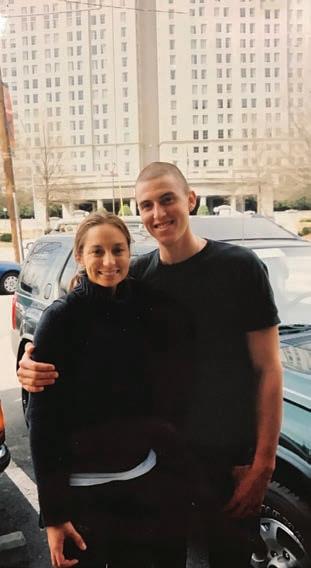
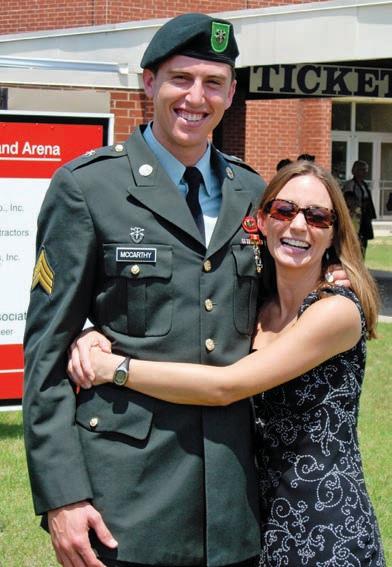
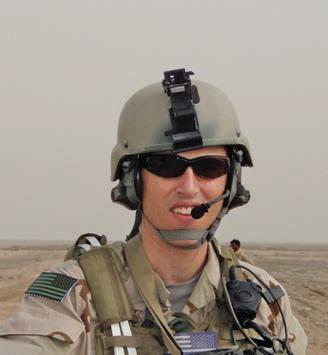

happened, and we slowly began removing carrying from our days. New technology killed our need to run or carry. We went from mules and oxen carrying our stuff to, now, shopping carts, wheeled suitcases, and Amazon Prime dropping anything and everything off at our doors. But unlike running, most of us never re-engineered carrying back into our days — except for ruckers.”
MCCARTHY IS NOT a fan of the buzz phrase, “optimize your life.” But he sometimes has a hard time explaining what his team of 50-plus employees is trying to do with the company. “It’s ludicrous,” he says, “that we can ‘optimize our lives,’” says McCarthy. But maybe it’s not so ludicrous that we can make better use of our


time for productivity and health by using what we know. “I learned pretty early on that the goal of business is not to go out and chase venture capital in order to feel important in investors’ eyes,” says McCarthy. “The goal is to follow your path in life and to have a mission you believe in.” His path started in the kitchen that day with his mother and his mission grew out of all the things Special Forces taught him about challenge and strength and health.
The turning point with the company came when he identified the communities already thinking along these lines. As enjoyable as his cross-country trek with Java might have been, he didn’t sell a lot of packs — it wasn’t a great business strategy. At the suggestion of a friend, McCarthy started making his
trips more strategic when he showed up at Tough Mudder events all along the East Coast and took notes. These events weren’t about the gear or the T-shirts or even the muddy obstacle course. They were about the experience — and the people who shared that experience. So what started as an idea to sell a rucksack soon became about selling better health and building community. GORUCK launched the GORUCK Challenge in 2010, which would grow into more challenges and three categories for ruckers starting with “basic,” which required five hours of time and a 7- to 10-mile hike with weighted packs, and leading to “heavy,” with a 24-hour challenge and a 40-plus-mile hike. Next came more than 500 regional GORUCK clubs,
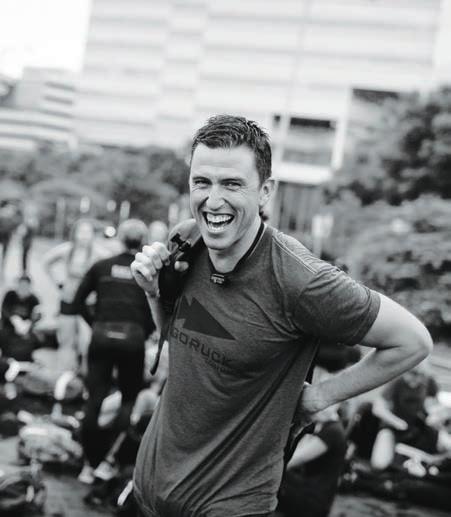

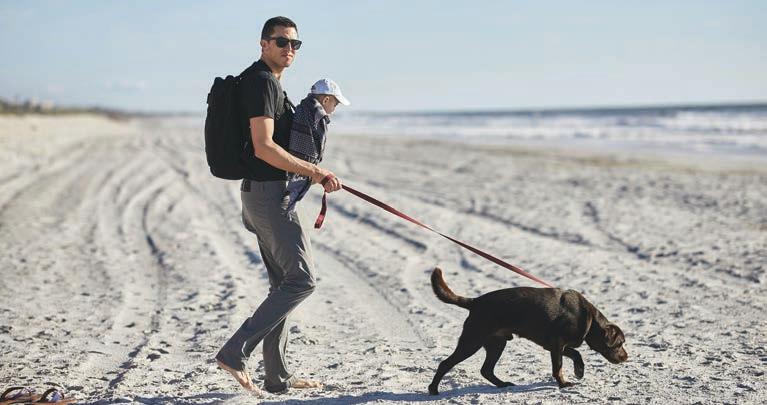
training programs for teams, and the GORUCK Games, an annual competition with a $50,000 grand prize.
McCarthy enjoys the competition and what GORUCK has built, but he’s not one to think that you need a six-pack and cut biceps to enjoy rucking. “I can channel my inner 22-year-old self, the person thinks walking is for old people at the mall, but it’s such a naive point of view,” he says. “You might hear comments like, ‘you should wake up every day and eat nails and be tougher and have more discipline,’ and that’s fine. But I’m not very good at eating nails. I’m good at figuring out what works.” And rucking works for him. Not just in business and fitness but in mental aptitude. “Listen to all the philosophers of all the ages.
Go read the quotes about the benefits of walking and thinking. I mean, Steve Jobs went on walk meetings, and philosophers often comment that their best ideas came while walking.”
In the Florida sun, McCarthy unzips his jacket. He’s managed to build up a sweat during his own walking meeting with a 45-pound pack on his back, though he’s also managed to carry on a long conversation without losing his breath. He has plenty to do: look at the latest numbers, see where the next GORUCK Challenge will take place, approve designs for new products like shoes and training gear.
But for now, McCarthy pulls his pack up onto his shoulders and just keeps rucking. GB
A few thoughts from GORUCK:
BURN MORE CALORIES: While rucking, you’ll burn a lot more calories than walking — not quite as many as running but about the same as jogging or doing functional fitness.
PERFECT YOUR POSTURE: The rucksack pulls your shoulders back, which is how they should be with proper posture, even without a rucksack on.
BUILD YOUR STRENGTH: You can scale with weight, which allows you to ruck at the same pace as anyone else and challenge yourself with an outdoor workout. Rucking builds muscle and strength while improving cardio and endurance. Bringing both types of exercises together provides a fuller range of benefits to improve your health.
MINIMAL GEAR: If you are new to rucking, don’t worry about which type of pack you use. Just add weight (when in doubt, 1020 pounds will do) and walk.
GET SOCIAL: The best part about rucking is the people. Social fitness helps with accountability and support. Rucking allows you to grab some friends, get outdoors, and move.
From business consultant to founder of a talent agency in Saudi Arabia — Molham Krayem’s musical adventure.
Molham krayem (B’17) is no stranger to betting on himself.
As an undergraduate student, he set out on several entrepreneurial ventures, including “Melties,” an ice cream-cookie sandwich company that became a staple at the farmer’s market on campus every week.
After landing competitive summer internships at UBS and Bain & Company, he accepted a full-time role as a consultant after graduation. While juggling 80-hour work weeks — where sometimes finding time to sleep proved to be a challenge — Krayem was simultaneously launching his music career. Today, he’s an international musician and the founder of Meteor Media Group, a talent agency based in Riyadh, Saudi Arabia.
“I would be up at 2 a.m. in my hotel room recording music on YouTube beats,” Krayem said. “I’d sleep for two to three hours, then wake up to work on a 30-tab, interconnected Excel sheet overseeing millions of dollars for a client. But I was driven by pure passion.”
While pursuing music came as a shock to some friends and family, he knew it was time to chase a dream.
“I hope to be someone who has helped people live lives that are more true to themselves,” Krayem said. “People can be
asleep at the wheel as life passes them by. I hope to be the speed bump that helps them reclaim control.”
In describing his music, Krayem said he leans into his roots; producing music in both English and Arabic. He doesn’t want to be bound by genres and can be found creating pop, rap, or R&B music, depending on the day. For Krayem, music is a way to express himself.
“Artistry is just as much about your brand as it is about talent or hard work,” Krayem said. “Don’t let other people or current trends define your brand. Craft your brand to be reflective of who you really are, and what you want to be known for, when you leave this Earth.”
While Krayem already has been recognized for his musical talents, including being named on the Forbes Middle East 30 Under 30 List, he explained there is more he wants to achieve.
“I’ve been lucky to release a record that’s gone viral on TikTok and to collaborate with brands like Nescafé, Samsung, and Amazon. But I genuinely look at everything I’ve done and don’t feel like I’ve even scratched the surface of my music career’s potential. I’ve spent the last four years building what’s now become Saudi’s largest talent agency. So, musically, I’m just getting started.”
—RACHEL ELLIS
 While juggling 80hour work weeks as a consultant, Molham Krayem simultaneously launched a music career.
While juggling 80hour work weeks as a consultant, Molham Krayem simultaneously launched a music career.
BSBA
1981 – 1982
Georgetown classmates Phil Geyer (B’81), Jamie Daly (C’81), and Karen (Malewski) Scaduto (C’81) joined family and friends to ride in their fourth Bike Multiple Sclerosis: Nation’s Capital in Reston, Virginia, and 13th Bike MS: City to Shore in Cherry Hill, New Jersey, charity bicycle rides. At both events, they rode under the team name “Valli Boyz and Galz” to support Georgetown classmate Valli Baldassano (C’82), who has been living with MS for more than 30 years and is a past National Board member of the National Multiple Sclerosis Society. Other Hoya classmates joined Valli Boyz and Galz team riders the day before the City to Shore event at Baldassano’s home near Philadelphia, including Lane Williams (B’81), Jean (McNamara) Burke (C’81),
Meg (Reynolds) Smith (C’82), and Monica DeBarcza (C’82)
This year’s Valli Boyz and Galz teams raised over $18,000 and have collectively raised close to $135,000 since forming in 2010.
1983
Michael G. Hogan (B’83) has been named chief financial officer of all entities of the Lauola Pono Foundation, addressing the health needs of native Hawaiian people.
1986
Directly after celebrating his 60th birthday, Alexander Hunger (B’86) took advantage of an early retirement program at Volkswagen AG where he spent more than 23 years handling investor relations and managing capital market-relevant ESG issues. He now plans to focus on his scale model business and “Yellow
Radiation,” the indie rock band he’s in with his wife, where he is the bassist.
1997
Latoya Kamdang (B’97) recently was installed as an at-large director on the Executive Board of the American Institute of Architects.
Eric Wall (B’99) has been appointed executive vice president of Syllo, the litigation platform for the AI era. Wall spearheads Syllo’s efforts to further expand the network of users and develop new relationships with law firms, legal service providers, and in-house legal departments. Wall previously served as CEO of Equivity, which provides dedicated virtual assistant services to individuals and organizations. Prior to Equivity, he spent more than a decade as
a litigator, serving most recently as a partner at Quinn Emanuel Urquhart & Sullivan.
Thomas Chepucavage (B’01) co-founded a battery company, Flow Aluminum, that has developed an aluminum-CO2 battery alternative to lithium-ion. The battery is high-performance, low-cost, non-flammable, and uses no rare earth minerals such as lithium, cobalt, nickel, manganese, or graphite. Flow Aluminum has closed a pre-seed round, raising more than half a million dollars, and is partnering with electric vehicle companies, original equipment manufacturers, and grid integrators.
Katherine DeStefano (B’10) was promoted to associate general counsel, Litigation and Dispute
“ Many MBA programs tout the value of their networks, but Georgetown has delivered on this promise. Hoyas, no matter the program, support each other. Not only have I made lifelong friends, but I’ve built and grown a business thanks to the ongoing support of this network, which stretches far beyond the walls of the business school.”
—NATALIE
Resolution at the United States Olympic and Paralympic Committee.
2012
Andy Levin (B’12) was promoted to shareholder in Ogletree Deakins’ Phoenix office. His practice focuses on litigating wage and hour class actions and California Private Attorneys General Act representative actions in varying industries, including agriculture, automotive, financial services, manufacturing, pharmaceutical, retail, sports, and technology.
2014
Kristin Keen (C’04, EMBA’14) was named president of REDLINE, a Black female-led animation and visual storytelling company in Charlotte, North Carolina, that works with litigation, corporate, and culture and lifestyle clients.
EML
2014
Tycely Williams (EML’14) chief development officer at The Bipartisan Policy Center, was named to The Nonprofit Times’ 2023 “Power & Influence Top 50” list.
2020
James R. Freiman (EML’20) is now CEO at Observer Media in New York City.

MY FIRST JOB
A decision to launch his career overseas was one of Edward Millet’s best decisions yet.
a typical commute to the office for Edward Millet (MiM’23) is on a bicycle with views of cozy cafes, canals, historic landmarks, and an array of languages — namely, Dutch. Millet moved to Amsterdam after graduating from the M.S. in Management (MiM) program to pursue a new challenge at The Kraft Heinz Company.
“It was a complete leap of faith moving to a new country,” Millet said. “It was incredibly terrifying. But it is the single greatest decision I’ve ever made. Sometimes you need to put yourself in really uncomfortable positions to grow.”
A self-proclaimed global enthusiast, Millet has emphasized international learning and professional experiences throughout his life. In fact, the Global Business Experience was a main selling point in choosing Georgetown for his
master’s degree. “I knew that if I wanted to work internationally, I should probably give it a test run,” Millet said.
As part of the company’s development program, Millet is grateful to both expand his portfolio and to be further pushed outside his comfort zone.
Millet said having ambition is key to success in any environment, but especially when paving the way for a career. “It’s important for a company culture to encourage ambition. If you are ambitious, you should say it out loud.”
As Millet continues to learn from colleagues, mentors, and friends in the Netherlands, he’s appreciating the ride and the little victories along the way.
“When I started at Kraft Heinz, I had a goal. I had a dream. I still have that goal, but I’ve learned to appreciate the journey of the unknown, too.”
—RACHEL ELLIS
“Being Present is thinking about how you are ‘socially present’ ever y moment of every day. Our ubiquitous digital devices and our over-scheduled calendars mean that we can be reached anywhere at any time. So we have to be intentional about the way we show up in conversations and meetings. Our tasks and our relationships depend on this focus.”
—JEANINE TURNER, ANNETTE N. SHELBY CHAIR IN BUSINESS AND LEADERSHIP COMMUNICATION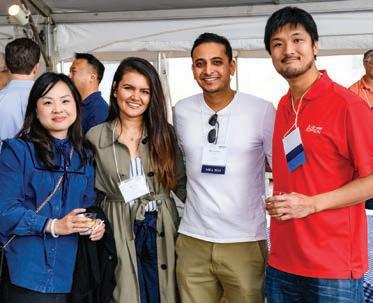

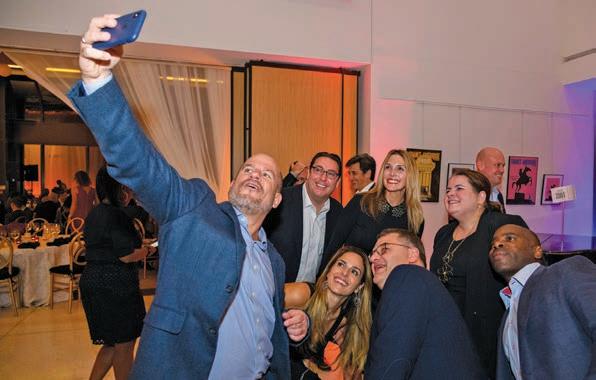


Georgetown University
McDonough School of Business
Office of Marketing and Communications
211 Rafik B. Hariri Building
37th and O Streets, NW
Washington, DC 20057
at the 2023 Luminaries Series — an annual Steers Center event that brings together real estate industry professionals for a keynote speaker, panel discussion, and networking opportunities. $1.3M of assets
41 students enrolled in the inaugural Master of Science in Global Real Assets, designed to prepare rising professionals for the new reality of the real estate and infrastructure marketplace on issues such as sustainability, risk management, and the new investment landscape.
under management in the undergraduate studentrun Georgetown University Public Real Estate Fund and the Steers Private Fund
15
years of global real estate finance programming, thought leadership, and outreach through the Steers Center for Global Business.
students have graduated with the MBA Certificate in Global Real Estate since its launch in 2022.
since 2015 to recognize the top MBA students dedicated to commercial real estate.
students annually embark on a five-day Global Real Estate Trek in London to meet with industry leaders, network with alumni, and learn about the private sector and infrastructure development, property ownership, and real estate financing.
members of the Steers Center’s advisory board across the executive, steering, and associate committees.
#14
in the United States for careers in real estate (U.S. News & World Report, 2024).